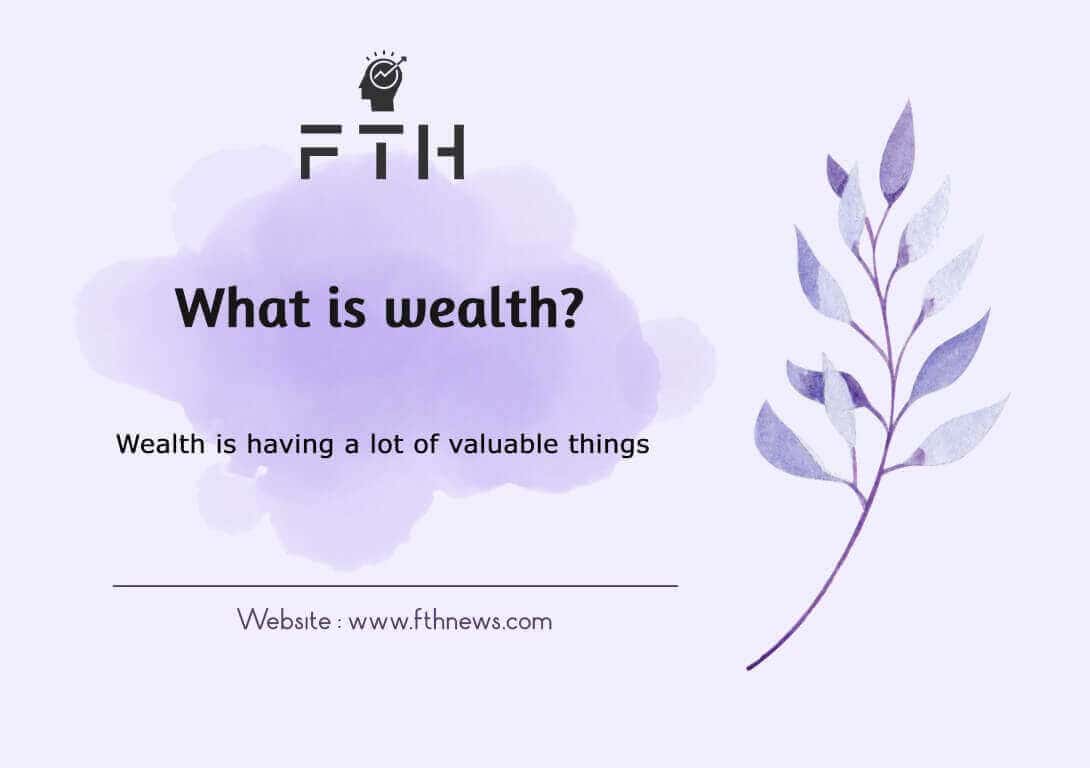
what is wealth: Exploring Its Profound Meaning and Significance
What is wealth? Wealth is a measure of the value of all assets owned by a person, society, company or country.
Wealth is obtained by considering the total market value of all assets of a person or institution and deducting all debts from it.
In fact, wealth is the sum of available resources. People are always told that when you can acquire many valuable resources or goods, you will become rich.
what does wealth consist of?
What constitutes a person’s wealth has varied over time and in different societies.
For example, the ancient Egyptians had a monetary system based on wheat. Some other cultures used other goods instead of money, such as rice or salt.
Eskimo communities traded with whale oil, which could be used both as food and as fuel for heat and light.
African tribes and Native American tribes used beads and objects in particular as the basis of the monetary system.
Today, calves and cattle are still used for trade in some cultures.
But in advanced societies, it was gold and silver that formed the foundations of the monetary system in many countries.
the price of gold and silver fluctuated and it rarely happened that its value remained stable for a long time. For example, during World War II, the government outlawed private ownership of gold. Economists have debated for decades whether the value of government currencies is tied to silver and gold reserves.
What is wealth measured by?
Money is the most common measure of wealth (the more money, the richer).
The value of the product used as the basis of a monetary system depends on how many people are willing to transact wit it.
Another criterion is the degree of acceptance of that product or thing in the world.
If no one outside of a society is willing to accept that money for goods or services, that money has no value outside of its homeland.
(For example, there are few countries where US dollars are not accepted, but there are many countries where you cannot trade with Iranian Rials).
The degree of influence of external forces and their ability to manipulate the value of money can have a significant impact on measuring wealth.
One of the biggest problems with banknotes is that they can be tampered with and their value reduced by the actions of one person or several people through forgery.
Another problem with government currencies is the ease of manipulating the value of money by printing more of it (to facilitate lending) and printing less of it (to increase restrictions on granting credit) by the government and the central bank.
It is also possible to define wealth in another way and consider it in three general categories:
- Financial Security
- life with goal
- Physical and mental health
How is wealth calculated?
Kim Kiyosaki, the author of the book Rich Woman, considers wealth to be the result of dividing the sum of monthly income without working and savings by monthly living expenses.
In fact, the total cost of living in a month should be calculated first.
One thing that should be noted is that we should calculate all living expenses in such a way that our quality of life does not change.
For example, if we travel by taxi or private car every month, consider the cost in full and realistically. In fact, let’s not make an exception that I might take a bus or not use a car at all. Then calculate the money we have that does not include our salary, such as savings, stocks or any cash.
Of course, pay attention to this point, we are not going to consider an amount for the sale of assets such as houses, cars, gold, etc., and only the available amounts that are cashable are calculated. Finally, we divide the available amounts by monthly expenses.
Laws of wealth
Parkinson’s Law is one of the best and most important laws related to wealth and savings.
This law years ago by C. North. Kat Parkinson has written and explains why some people are poor in retirement.
This law says that no matter how much income people have, their tendency is to spend all their income and a little more. Their expenses go up in proportion to their income.
It doesn’t matter how much they earn, because it never seems to be enough. The first takeaway from Parkinson’s Law is “Financial independence comes from breaking Parkinson’s Law.” Parkinson’s Law explains a trap that many people fall into.
This is the reason for debt, money worries and financial despair. It’s only when you resist the powerful urge to spend money that the savings start and you get ahead of the rest.
If you let your expenses grow at a slower rate than your income and save or invest the difference, you will achieve financial independence during your working life.
In other words, if you can create a gap between the increase in income and the increase in your living expenses, and then save and invest this difference, you can constantly raise the quality of your lifestyle while earning more.
How to have a lot of wealth?
It is good to know that wealth is not supposed to provide our life as much as our years.
To achieve financial independence, we must have inexhaustible wealth.
For this purpose, we must learn to invest our income; Because the income, if not invested, ends and does not have the power to create more money by itself. Therefore, it can be concluded that each person’s living expenses determine the amount of cash flow he needs.
A lot of wealth is different for each person; Because each person has an opinion about wealth according to their current income conditions. Maybe 100 $ is a lot of wealth for one person and 10 billion $ is not a lot of wealth for another.
Robert Kiyosaki is one of the most successful and richest people in the world and the creator of the famous and best-selling book Rich Dad, Poor Dad.
According to Kiyosaki, “Wealth is how long you can last if you don’t work…” And of course, Robert Kiyosaki continues: Wealth has a direct relationship with power, if you don’t work from today, how long can you live the way you have?
So if you want to know how rich you really are according to Robert Kiyosaki, if you don’t go to work starting today, how long will you be able to live without having to work and keep your power?
It is good to know that the concept of “rich” is different from “rich”.
If your definition of being rich is anything other than being rich, you may never be truly rich.
Because getting rich and getting rich are two different categories.
A rich person is a person who simply has a lot of financial means. But a rich person is a person who can be powerful without thinking and create wealth.
Apart from money, this wealth can include successful communication, spirituality, knowledge, health and entertainment.
In other words, if you can establish a balance in your life and feel good, the title of rich suits you.
You have a long way to go to get rich.
first you need to be able to increase your knowledge about getting rich. By increasing your knowledge, you can cultivate your own thoughts in the direction of wealth development. You should also know that entrepreneurship is part of the process of getting rich.
How to increase your wealth by investing?
Brian Tracy says: The Law of Investing is the most important of the money laws and refers to doing your research before investing.
In order to put money into an investment, you should spend the most time studying and researching that particular investment.
Never part with your money too quickly. You have worked hard to earn this money. So before you make any commitment, research every aspect of the investment. Ask for all the details.
Ask for sufficient, accurate and honest information about the investment.
If you are in doubt about your decision, it is better to keep your money in the bank.
The first takeaway from the law of investing is this: the only easy thing about money is losing it.
In this competitive market, money is hard to come But easy to lose it.
The second conclusion of this law can be heard from the self-made billionaire Marvin Davis who said: Don’t lose money. If there is a possibility that you will lose your money, don’t part with it in the first place.
The third conclusion of the investment law says.
If you think you can only lose a little money, you will end up losing a lot of money. Remember that a fool and his money will soon be separated! When an experienced man and a rich man meet, the rich man gets experience and the experienced man gets rich! So don’t accept the investment in the first place. Only invest in things you absolutely believe in.
what is generational wealth?
Generational wealth refers to assets, money, and investments passed down from one generation to the next. It’s like a financial legacy that can provide opportunities, security, and a better future for your descendants.
This wealth isn’t just about having a lot of money.
it’s about using it wisely to create lasting financial stability for your family and future generations.
It often involves strategies like investments, property ownership, and financial education
How to Become Wealthy
Becoming wealthy involves a combination of financial discipline, smart investing, continuous learning, and making strategic life choices. Here’s a simplified guide:
- Set Clear Goals: Define your financial objectives, both short-term and long-term.
- Budget and Save: Create a budget to track your expenses and save consistently.
- Invest Wisely: Diversify your investments in stocks, bonds, real estate, and other assets to grow your wealth.
- Continuous Learning: Invest in education and skill development to increase earning potential.
- Entrepreneurship: Consider starting a business or side hustle for additional income.
- Avoid Debt: Minimize high-interest debt and manage it wisely.
- Live Below Your Means: Avoid excessive spending and lifestyle inflation.
- Financial Advisors: Seek advice from financial experts for sound investment strategies.
- Estate Planning: Plan for the efficient transfer of wealth to heirs and minimize taxes.
- Generosity: Practice philanthropy and give back to causes you care about.
Remember, wealth-building is a long-term journey that requires patience and discipline. Start early, stay consistent, and adapt to changing circumstances to achieve financial success.
What is wealth vs rich?
“Wealth” and “rich” are related concepts, but they have distinct differences:
Wealth:
- Long-term: Wealth typically implies a sustainable and enduring accumulation of assets, investments, and resources.
- Holistic: Wealth encompasses various aspects of life, including financial prosperity, health, relationships, and personal fulfillment.
- Lifestyle: Wealth often allows for a comfortable and secure lifestyle with financial stability.
Rich:
- Short-term: Being “rich” often refers to having a significant amount of money or assets at a specific point in time.
- Focused on Money: Being “rich” primarily revolves around financial abundance without necessarily considering other aspects of life.
- May Not Be Sustained: Riches can be temporary, and individuals who are considered rich may not maintain that status over the long term.
FAQ
Wealth is having the resources, health, happiness, and freedom to live a fulfilling life on your own terms.
Wealth is having enough resources, including money, investments, and other assets, to live comfortably and achieve your long-term goals. ‘Rich’ usually means having a lot of money, but it doesn’t necessarily guarantee lasting financial security or overall well-being.
Example: Owning a diverse investment portfolio, a well-maintained home, and having enough savings to cover unexpected expenses represents wealth because it offers both financial stability and the means to enjoy life without constant worry about money.
Wealth means having a lot of valuable things, like money, property, and investments, which can make life comfortable and secure.
Wealth is important because it gives you financial security, freedom to do what you want, and the chance to help others. It’s like a key to a better life.
No, money is not the sole measure of true wealth. While money is an essential part of wealth, true wealth encompasses a broader spectrum of assets and resources, including good health, fulfilling relationships, personal happiness, and the ability to live life on your terms. Money is a means to achieve certain aspects of wealth, but it’s not the entirety of it.
Wealth is like a treasure chest that holds good health, happiness, time for what you love, and the power to make the world better, not just money in your pocket.














